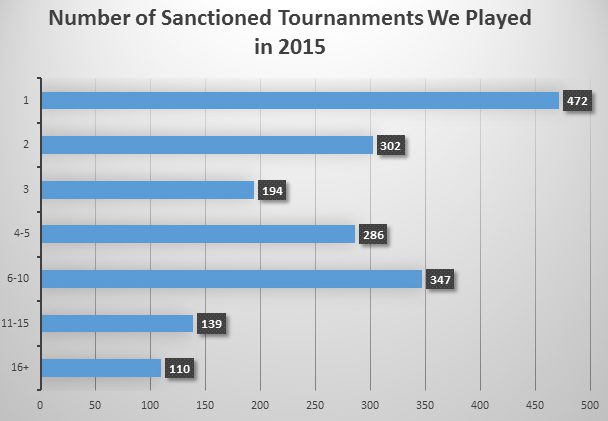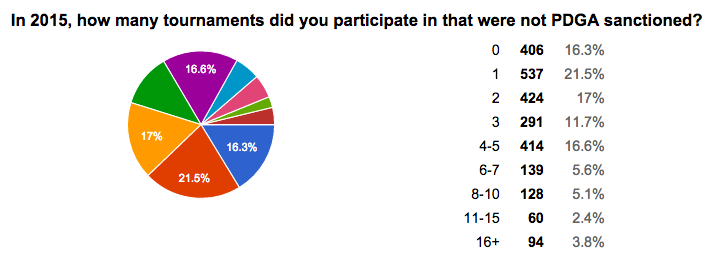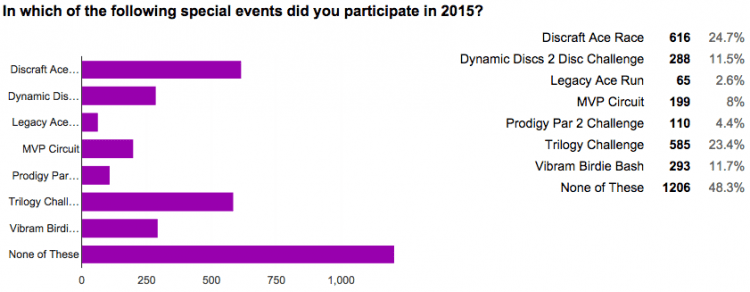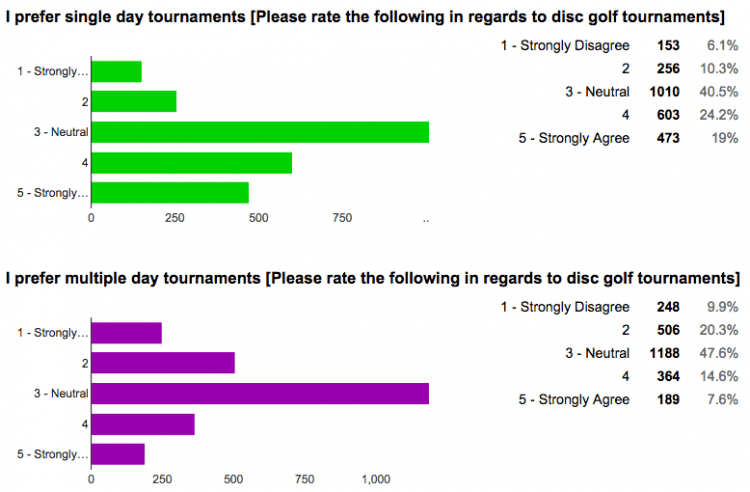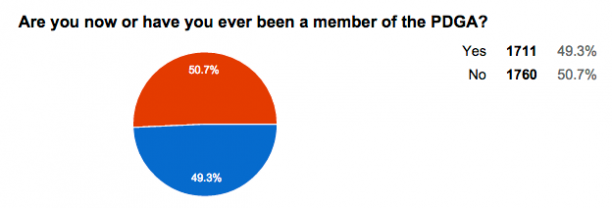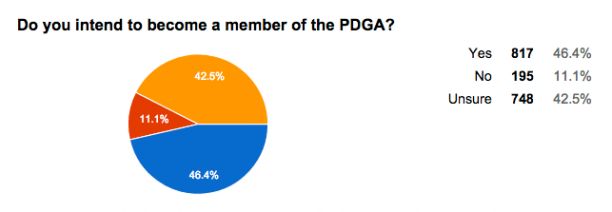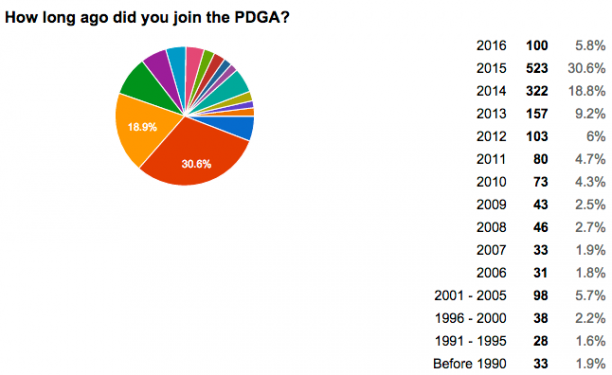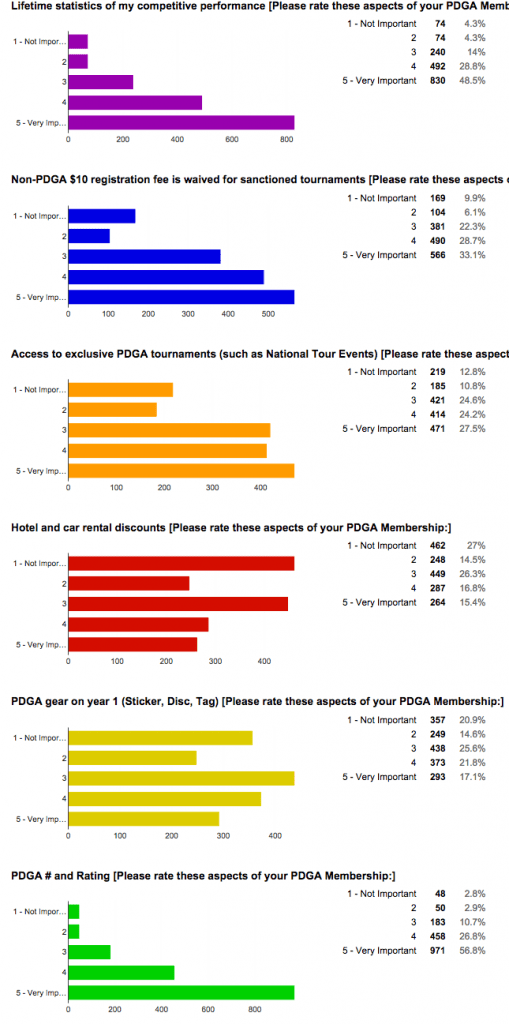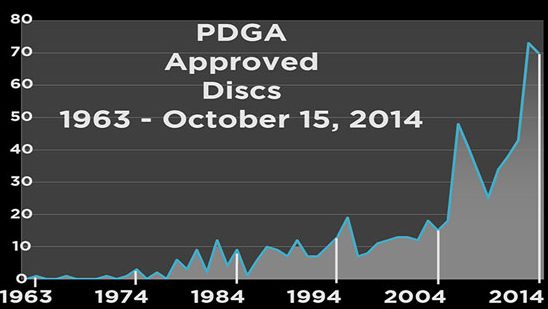When the PDGA pronounced an 18-month suspension of professional player, Bradley Williams, because of a shoulder-check leaving the tee at the 2016 Ledgestone Insurance Open, it began a cascading effect that may have reached its apex with the Pro-Tour decision to separate the finale from the PDGA by making it a non-sanctioned event. It didn’t take much for the wave to swell. One of the biggest names in disc golf, Paul McBeth, quickly posted on social media that he desired more transparency from the PDGA about the decision, and soon thereafter announced that he would not play non major PDGA events in protest. Pro Tour organizer, Steve Dodge, then made the announcement that he’d decided to separate the Pro Tour from the PDGA, making the finale an “unsanctioned tournament”.
There are many more details and undercurrents that can be researched about those cascading events, but the intention here is not to outline what happened, but simply to follow that chain of events down the rabbit hole. Let us project the attitude of separation further and ask some relevant questions that arise when a major tournament featuring top-tier pros suddenly declares that it does not need the existing governing body. For example, does separation from the PDGA really mean anything if the tournament still happens with the same players, the same payouts, and the same media attention?
The Value of The PDGA
What does the PDGA offer in terms of value?
According to the 2016 State of Disc Golf Survey, the most important aspect of PDGA membership is player ratings. 86% of respondents said that their PDGA# and Rating was “Important” or “Very Important”.

Survey respondents also value being able to see lifetime statistics of their competitive performance that appear on the PDGA website for current paying members.

A good number of those surveyed also value PDGA membership so that they don’t have to pay the $10 non PDGA registration fee for the tournaments they play.

If the PDGA is a governing body (the organization that sets the rules), how did they become such, and are they necessary if the independent tournament sets their own rules– rules which are accepted by the participating players? The list of questions and “what if’s” could go on and on.
The real question is, if the big names in disc golf start shunning the de facto governing body, then how long before that governing body no longer has any sway at all? It would carry into all aspects of the game, because the PDGA only has whatever power the players concede to give it through united acceptance. Take away that acceptance, even piece by piece, and the power lessens. If the Pro Tour says “we don’t need you” and it doesn’t change the material outcome of their events, then how long before smaller tournaments decide that PDGA sanctioning is no longer a necessity for their events either?
For example, the Cache Valley Classic is a PDGA sanctioned event that takes place in Logan, Utah, where Infinite Discs is located. It doesn’t draw big-name pros, but it fills a full roster of intermediate, advanced, and open players. By sanctioning the event, the PDGA established guidelines that had to be followed to the smallest detail, and also meant that a check for a few hundred dollars had to be written out to the PDGA.
What was the payback in terms of the event’s outcome? Would fewer players have come without sanctioning? Would it have been any less or more of a success, had those hundreds of dollars been withheld? It’s hard to say. It is possible that fewer of those open players who have sponsorship deals would have come. In their absence, more advanced, intermediate and even recreational players might have paid to participate, quickly filling any vacancy. What would have ultimately been missing? A stamp of approval? A formulaic ranking for the event, the course, and the players?
Let’s assume that PDGA rules are removed from previously sanctioned events? Who then becomes the governing body? Who enforces a standard? Is it too much of a stretch to assume that the tournament directors could step in and say, “these are the rules associated with this particular tournament”. What might happen then? There are a couple of possibilities. If the players all understand and approve of the rules and still love the way the tournament is set up, then certainly that is enough. If the players don’t like the rules, don’t show up to play, and don’t have a good experience with the tournament, then the event fails, probably loses money, and likely won’t be repeated.
The tournaments that set welcome and appropriate standards for participation would succeed. The ones who muck it up would fail. Is that a bad formula for the growth of disc golf as a competitive sport? Or is it too much like anarchy if there were no central authority figure, like the PDGA, to keep rules consistent and put their stamp of approval on events?
Technical Standards
The PDGA is not only involved with events, but is also responsible for the technical standards of the game. They set the guidelines for approved targets in tournament play, which all of us who have played temporary courses with home made bicycle wheel baskets are grateful for.
The PDGA makes the ultimate decision to approve or not approve the discs that can be thrown in the game of disc golf. Of course, that technically means the discs that can or can’t be thrown in PDGA events, but the power of that “stamp of approval” has shaped the disc market. An approved disc is much more likely to sell successfully and has a shot at becoming a staple in the game. An unapproved disc is quickly dropped from production and banished into the dark corners of forgotten products. How many players own a Gateway Ninja disc? Not many. It is unapproved. How many players pull out the outlandish looking Turbo Putter? Not many, because it is unapproved and thus is nothing more than a collectible novelty. But if tournament promoters were to separate from the PDGA who set the disc guidelines, then it is logical to say that players could pull out whatever disc the tournament director allows. Suddenly, that unmentionable 180g Destroyer comes into play. Suddenly somebody brandishes a sharp-edged Ninja disc, or an Aerobie that they can throw 800 feet.
If the tournament director says, “follow PDGA guidelines” then that certainly sets the rules. This is what the Utah Open, an “unsanctioned” tournament that will be on the Pro Tour next year has done. Would, or should, an unsanctioned tournament need to pay the PDGA for declaring an enforcement of the rules and standards that were set by the PDGA?
Can Tournaments Effectively Govern Themselves?
Let’s go back to the small action that started this chain of cascading events. Let’s assume that a tournament is non PDGA sanctioned, and one player walks past another player who is approaching the tee and gives them a shoulder-check, either intentional or non-intentional. Does the offended player have recourse if they can’t call up the PDGA and complain? Of course they would. They’d simply tell the tournament director, “this guy behaved in an unsportsmanlike manner toward me, and it effected my game.” The tournament director, who is then the immediate governing body, then could decide the appropriate response. Maybe the result would be to add penalty strokes, or maybe to kick that one player out of the tournament, or even take the extreme of saying, “you’re not welcome here anymore…ever.” That’s their call. The tournament would then either benefit or lose credibility based on that decision, and that is where it ends. It doesn’t go beyond that. It doesn’t bleed into other tournaments, other opportunities, and a player’s ability to seek a livelihood with winnings.
In a world where there is no longer a generally accepted governing body, is disc golf better off? Would it continue to grow? Of course. The game is addictive, fun, challenging, beautiful, and would continue to be so, even without an entity setting rules which really aren’t changing much. But would it be perceived as less professional without that entity watching over the competitive side of the sport? Probably. Do we need an NFL, a PGA, an NBA, an NHL? Or do we take disc golf in a different direction that feels more open, more free, more organic, and less ruled by red tape?
Ratings
Another argument for the role of the PDGA remaining solidly implanted within the competitive disc golf world is that they have created a system of rating players, tournaments, courses, and events. Those ratings can consistently rank players in order, determined by performance. It is a mathematical formula, and the variables within that formula have been established and fed with data which helps division assignment. Thus, the ratings and rankings seem to make sense and treat all players, across the board, fairly. That matters, assuming you’ve paid the dues to become a member of the PDGA and you care about playing in a manner that produces accurate ratings. If the PDGA were to vanish, taking away those rankings, would chaos ensue? Would players suddenly feel like they have no measuring stick by which to evaluate their game play?
Many have argued that the disc golf rating system should be replaced with something more similar to ball golf.
While the PDGA does have a rating system that in most opinions is pretty good, it’s definitely not something that can’t be replicated or replaced. While our intention is not to create an official rating, Infinite Discs has created the Infinite Rating that uses and creates ratings very near those created by the PDGA. These ratings have been very valuable for creating divisions for our local disc golf events, especially for those players who are not PDGA members.
Compare the PDGA rating and the Infinite Rating from our recent tournament:
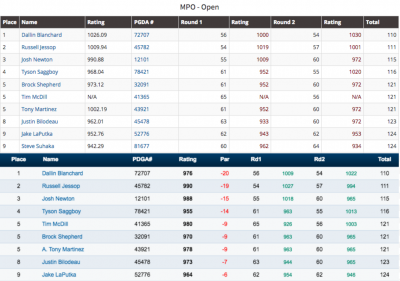
The main difference between the results is that the Infinite formula creates round ratings based on past results.The first round of the Infinite formula is based off of scores submitted before the tournament, while the second round is based off of scores submitted during the first round. The PDGA formula compares scores and determines a rating solely from within that round.
Formulas like these take the X’s and the Y’s into account when players upload scores from different courses, and then calculate a course rating, subsequent player ratings, and even individual round ratings based on averages within the existing data set. In the case of Infinite Courses, there are still very few courses and players that have a rating. Players need to upload scores under a variety of circumstances and in different locations for the X’s and Y’s to be replaced by actual, meaningful data. All it takes is enough people uploading scores in enough places, and suddenly there is a full-fledged rating system that can do essentially the same thing the PDGA system does, but without membership fees, and without the pretense of a governing body. Infinite Courses is free to access, free to use, and easy to pull up a variety of stats and comparisons, if that’s what you want out of your game. There will still be those in the silent majority who will never care about rantings, averages, and comparisons. They just want to play disc golf.
Ultimately, we can’t currently answer the questions posed by a world without the PDGA. Undoubtedly there would be less standardization in tournaments. With some of the current events, it sure teases us all with a glimpse of what that world might look like. We can imagine it. We could long for it, or we could fear it. But we probably shouldn’t worry about it, because with or without the PDGA, disc golf will continue to spread like wildfire. There is something magical in the disc golf experience which can’t be suppressed.
We want your opinion. If you are a PDGA member, what aspects of the PDGA enhance your disc golf experience? If you aren’t a member, are you more or less inclined to play a tournament if it is sanctioned by the PDGA? Is there something we’re missing that makes the PDGA more essential than we can comprehend?

 Although the exact algorithm isn’t made public, we know approximately how they are determined. Ratings are based on the scores you’ve earned in PDGA-sanctioned events. Here’s how it works:
Although the exact algorithm isn’t made public, we know approximately how they are determined. Ratings are based on the scores you’ve earned in PDGA-sanctioned events. Here’s how it works:
 There are limits set by the PDGA that restricts people a high enough rating from playing in certain divisions. As mentioned, it’s also a handy way to track your progress over time. And let’s be honest, there’s something satisfying about seeing that number trend upward.
There are limits set by the PDGA that restricts people a high enough rating from playing in certain divisions. As mentioned, it’s also a handy way to track your progress over time. And let’s be honest, there’s something satisfying about seeing that number trend upward.
